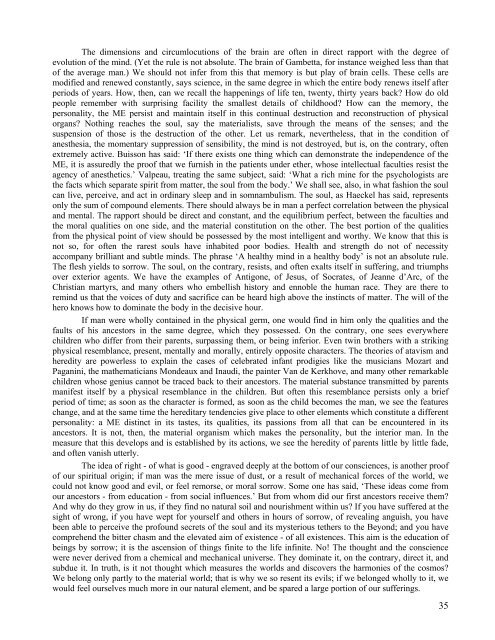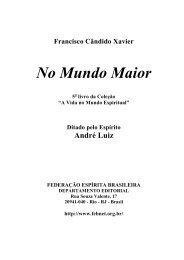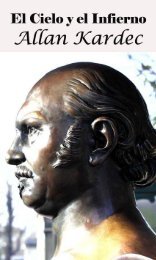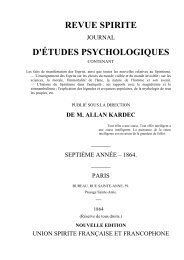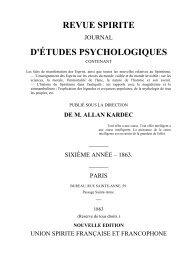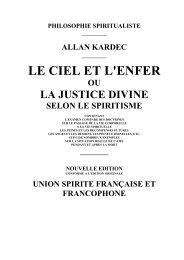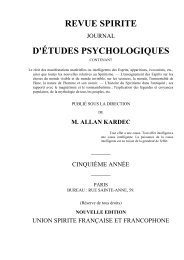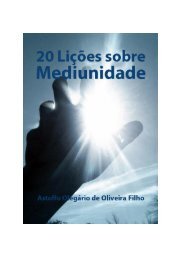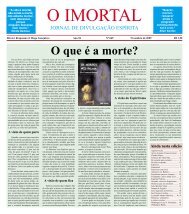PDF version - Geae
PDF version - Geae
PDF version - Geae
You also want an ePaper? Increase the reach of your titles
YUMPU automatically turns print PDFs into web optimized ePapers that Google loves.
The dimensions and circumlocutions of the brain are often in direct rapport with the degree of<br />
evolution of the mind. (Yet the rule is not absolute. The brain of Gambetta, for instance weighed less than that<br />
of the average man.) We should not infer from this that memory is but play of brain cells. These cells are<br />
modified and renewed constantly, says science, in the same degree in which the entire body renews itself after<br />
periods of years. How, then, can we recall the happenings of life ten, twenty, thirty years back? How do old<br />
people remember with surprising facility the smallest details of childhood? How can the memory, the<br />
personality, the ME persist and maintain itself in this continual destruction and reconstruction of physical<br />
organs? Nothing reaches the soul, say the materialists, save through the means of the senses; and the<br />
suspension of those is the destruction of the other. Let us remark, nevertheless, that in the condition of<br />
anesthesia, the momentary suppression of sensibility, the mind is not destroyed, but is, on the contrary, often<br />
extremely active. Buisson has said: ‘If there exists one thing which can demonstrate the independence of the<br />
ME, it is assuredly the proof that we furnish in the patients under ether, whose intellectual faculties resist the<br />
agency of anesthetics.’ Valpeau, treating the same subject, said: ‘What a rich mine for the psychologists are<br />
the facts which separate spirit from matter, the soul from the body.’ We shall see, also, in what fashion the soul<br />
can live, perceive, and act in ordinary sleep and in somnambulism. The soul, as Haeckel has said, represents<br />
only the sum of compound elements. There should always be in man a perfect correlation between the physical<br />
and mental. The rapport should be direct and constant, and the equilibrium perfect, between the faculties and<br />
the moral qualities on one side, and the material constitution on the other. The best portion of the qualities<br />
from the physical point of view should be possessed by the most intelligent and worthy. We know that this is<br />
not so, for often the rarest souls have inhabited poor bodies. Health and strength do not of necessity<br />
accompany brilliant and subtle minds. The phrase ‘A healthy mind in a healthy body’ is not an absolute rule.<br />
The flesh yields to sorrow. The soul, on the contrary, resists, and often exalts itself in suffering, and triumphs<br />
over exterior agents. We have the examples of Antigone, of Jesus, of Socrates, of Jeanne d’Arc, of the<br />
Christian martyrs, and many others who embellish history and ennoble the human race. They are there to<br />
remind us that the voices of duty and sacrifice can be heard high above the instincts of matter. The will of the<br />
hero knows how to dominate the body in the decisive hour.<br />
If man were wholly contained in the physical germ, one would find in him only the qualities and the<br />
faults of his ancestors in the same degree, which they possessed. On the contrary, one sees everywhere<br />
children who differ from their parents, surpassing them, or being inferior. Even twin brothers with a striking<br />
physical resemblance, present, mentally and morally, entirely opposite characters. The theories of atavism and<br />
heredity are powerless to explain the cases of celebrated infant prodigies like the musicians Mozart and<br />
Paganini, the mathematicians Mondeaux and Inaudi, the painter Van de Kerkhove, and many other remarkable<br />
children whose genius cannot be traced back to their ancestors. The material substance transmitted by parents<br />
manifest itself by a physical resemblance in the children. But often this resemblance persists only a brief<br />
period of time; as soon as the character is formed, as soon as the child becomes the man, we see the features<br />
change, and at the same time the hereditary tendencies give place to other elements which constitute a different<br />
personality: a ME distinct in its tastes, its qualities, its passions from all that can be encountered in its<br />
ancestors. It is not, then, the material organism which makes the personality, but the interior man. In the<br />
measure that this develops and is established by its actions, we see the heredity of parents little by little fade,<br />
and often vanish utterly.<br />
The idea of right - of what is good - engraved deeply at the bottom of our consciences, is another proof<br />
of our spiritual origin; if man was the mere issue of dust, or a result of mechanical forces of the world, we<br />
could not know good and evil, or feel remorse, or moral sorrow. Some one has said, ‘These ideas come from<br />
our ancestors - from education - from social influences.’ But from whom did our first ancestors receive them?<br />
And why do they grow in us, if they find no natural soil and nourishment within us? If you have suffered at the<br />
sight of wrong, if you have wept for yourself and others in hours of sorrow, of revealing anguish, you have<br />
been able to perceive the profound secrets of the soul and its mysterious tethers to the Beyond; and you have<br />
comprehend the bitter chasm and the elevated aim of existence - of all existences. This aim is the education of<br />
beings by sorrow; it is the ascension of things finite to the life infinite. No! The thought and the conscience<br />
were never derived from a chemical and mechanical universe. They dominate it, on the contrary, direct it, and<br />
subdue it. In truth, is it not thought which measures the worlds and discovers the harmonies of the cosmos?<br />
We belong only partly to the material world; that is why we so resent its evils; if we belonged wholly to it, we<br />
would feel ourselves much more in our natural element, and be spared a large portion of our sufferings.<br />
35


